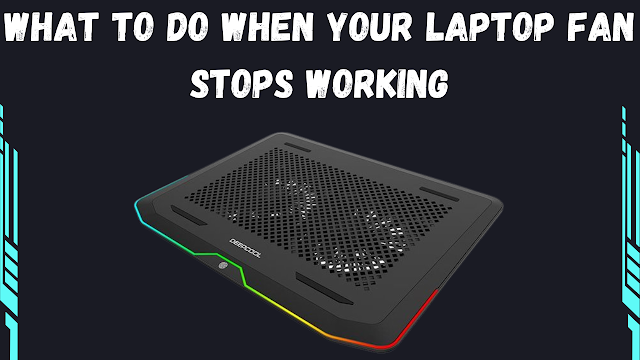What to Do When Your Laptop Fan Stops Working
How to Check if Your Laptop Fan is Working or Not
- Checking the Fan Using Built-In Software
Most laptops have software that allows you to monitor the state of your device's components. Here's how to use this program to see if your laptop fan is working or not:
1. To launch Task Manager, use Ctrl + Shift + Esc. You may also pick "Task Manager" by right-clicking on the taskbar.
2. Go to the Performance tab in the Task Management window.
3. Examine the CPU utilization graph. If your laptop fan is operating, you should see an increase in CPU utilization.
2. Go to the Performance tab in the Task Management window.
3. Examine the CPU utilization graph. If your laptop fan is operating, you should see an increase in CPU utilization.
You may also monitor the fan speed by navigating to the Performance tab and selecting "Resource Monitor." Look for the "Fan" option and experiment with the speed.
- Physical Checks to See if Your Fan is Working
If you're not comfortable utilising built-in software to determine whether or not your laptop fan is operating, you may perform a manual inspection. This is how it's done:
1. Power on your laptop and pay close attention to the noise of the fan. You should be able of listening to your laptop fan if it is operating.
2. Put your hand near your laptop's air vents. You should be able to feel airflow if your laptop fan is functional.
3. To determine the temperature of your laptop's hardware, you can employ a diagnostic tool such as HWMonitor. If the temperature is excessive, your laptop fan is most likely not operating correctly.
Want to Fix your cracked laptop screen without replacing? Check out our guide on "How To Fix your cracked laptop screen without replacing".
Can a Laptop Survive Without a Fan?
Laptops are built to work with fans, but can they function without one? The simple response is "yes," yet there are certain factors to take into account.
The Dangers of Using a Laptop Without a Fan
Laptops without fans may easily overheat. This can harm your device's components, such as the processor and hard disc. Excessive heat can also cause your laptop to shut down immediately, which leads to information loss or corruption.
When a Laptop Doesn't Need a Fan
A laptop may function without a fan in specific situations. For example, when you are using your laptop for simple activities like web surfing or microsoft word, it might not produce significant heat to necessitate the use of a fan.
What Should You Do If Your Laptop Fan Stops Working?
If you've discovered that your laptop fan isn't operating, there are a few solutions you might try.
- Cleaning the Laptop Fan:
Dust and dirt can collect on your laptop fan, causing it to malfunction. Cleaning your laptop fan may help to resolve the issue. Here's how to go about it:
Turn off your laptop: Prior to actually start cleaning the fan, make absolutely sure your laptop is powered off and unplugged from any power supply.
Locate the Fan: Depending on the type of your laptop, the placement of the fan will vary. To locate your fan, see your laptop's handbook or conduct an internet search.
Clean the Fan: Wipe any dirt or debris from the fan with a can of compressed air or a bristle brush. To avoid causing damage, keep the compressed air can upright and at least a few inches away from the fan.
- Replace the Fan on Your Laptop
If cleaning your laptop fan does not resolve the issue, it may be time to replace it. Here's how to go about it:
Buy a New Fan: A new fan may be purchased online or through a computer repair shop.
Remove the Cover: When you've found the fan, remove the cover or panel to gain access to it.
Remove the Old Fan: Unplug the cables that link the fan to your laptop and remove the screws that keep the fan in place.
Install the New Fan: Connect the wires and screws to the new fan. Make certain that the replacement fan is installed in the proper direction.
FAQS:
Q: How can I know if my laptop fan is broken?
A: You could notice that your laptop is operating hotter than normal or producing unusual noises. You may also use software to monitor your laptop's temperature and determine whether it has reached dangerous levels.
Q: Is it possible to run a laptop without a fan?
A: Certain laptops are intended to run without a fan, however they are mainly low-powered computers that produce little heat. A fan is required in most computers to keep the internal components cool and avoid damage.
Q: How often should I clean the fan on my laptop?
A: Cleaning your laptop fan every 6 months to a year's duration is a great thing, depending on how much you use your laptop and in what conditions. You might have to clean your fan more commonly when you're using your laptop in a filthy or unclean environment.
Q: Can I change the fan on my laptop myself?
A: You can change your laptop fan yourself, however it is a difficult process that may void your warranty. If you feel hesitant about doing the task manually, it's indeed advisable to seek the assistance of an expert.
Conclusion
If you own a laptop, it is critical that the laptop fan is in good operating order to guarantee that your computer performs optimally. If your laptop fan fails, it is critical that you solve the problem as soon as possible to avoid serious harm to your equipment. This article provides many methods for determining whether or not your laptop fan is operating effectively, including choices for cleaning or replacing the fan. If you are unsure about doing these operations on your own, it is strongly advised that you seek the advice of a professional. You may continue working on your laptop while keeping its temperature at a suitable level if your laptop fan is working properly.



.png)
.png)



0 Comments